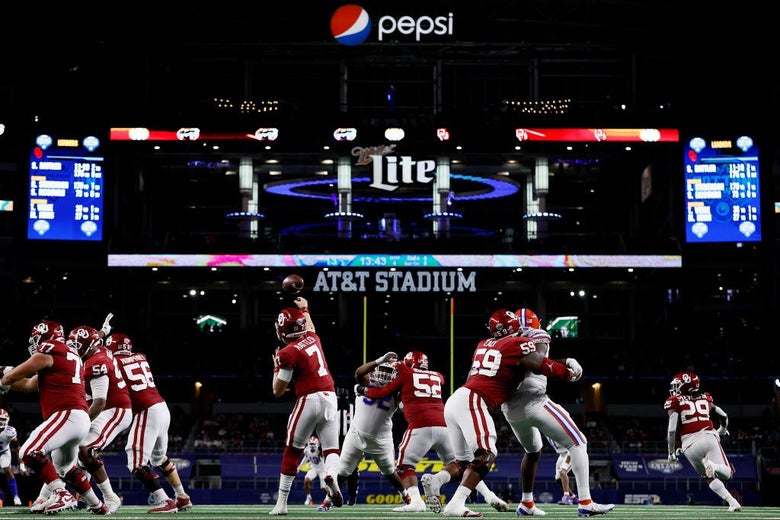
A few years ago I was at a sports bar, drinking a beer and talking to a friend of mine about sports. (Fantastic stuff!) I said something to the effect that while I enjoyed many of them—sports, that is—the one I felt that I loved the most was college football. The friend in question is a “bro” kind of guy, but a politically conscious one who was raised in the NCAAF-deprived Northeast, and he frowned in a smirking, smartassed kind of way. He told me that college football was “gross,” citing its over-invested provincial-psycho fans, its intense and sometimes abusive coaches, its sleazy boosters and corporate sponsors—a mob of unsavory predators circling around players who took the field in order to injure themselves for the artificially depressed wage of “you can go to class if you have time between weightlifting and film review.” I assume he felt the same way, with a little less emphasis on the physical toll of the game, about college basketball, a sport that I also like.
Well, Brian, who’s the politically conscious bro now? In a change that somehow seems underappreciated despite having been anticipated as a potentially titanic turning point for years, the NCAA acquiesced to a long-building wave of player activism, rabble-rousing media commentary, and state-by-state legislative one-upmanship on July 1 and conceded that its “student-athletes” can now be paid commercially for the use of their “name, image, and likeness,” or NIL, without becoming ineligible. The ruling has already begun to put above-the-table, legally contracted cash into the pockets of hundreds if not thousands of football players, basketball players, and other athletes, tilting an imbalanced power relationship toward fairness and eliminating one of the chief reasons that college sports spectators had to feel queasy. (Players still don’t technically have access to the hundreds of millions of dollars in advertising revenue they help create for conferences and athletic departments, but presumably some of that money was being paid to schools because brands weren’t allowed to offer it to athletes; there are also a number of plausible-seeming revenue-sharing proposals in circulation.)
The change in atmosphere is most immediately apparent, perhaps, around the announcements that a number of high-profile men’s basketball players, like March Madness star Johnny Juzang, have made in recent weeks about playing another year for their college teams rather than entering the NBA draft. To the pre-NIL fan of a college team, such announcements had become increasingly complicated by the awareness that returning stars were, at best, forgoing pro income in order to take a little bit of money under the table to play for coaches who may have persuaded them to return for reasons other than an objective evaluation of that athlete’s best interests. It was almost bad news to learn that one of your team’s biggest ballers, studs, hosses, or “bell cows” was “running it back” to “take care of unfinished business” by winning the big game/s. The rest of the conference was gonna be in trouble, for sure—but at what cost?
When a social media post about returning to take care of unfinished business can also announce the sale of personally branded jerseys, however, every part of the college sports equation falls into better balance—particularly when considered in combination with recently loosened rules regarding athlete transfers between schools. (Athletes who wanted to switch teams used to have to get permission from their original university to do so, then sit out a year before playing again; as of April they no longer have to ask permission, and can transfer once during their careers without sitting out the extra year.) Historically, coaches were screaming animal madmen who literally had control over players’ access to food and shelter; in the new arrangement, they are more like voluntarily contracted animal-madman skill-development consultants. Players who likely could have been drafted and gotten a developmental-league paycheck, meanwhile, are telling reporters they’re happy that NIL enables them to play another year in a campus setting, interacting with the school’s provincial psychos.
This gets to the heart of the matter. College sports’ defenders argue there is something especially valuable about competing within a university atmosphere, in a community of fans and alumni and so forth who have a stronger claim to holding a distinctive common identity than, for example, the crowd at a Brooklyn Nets game. Anyone being honest about the pre-compensation dynamics of the sport, though, had to wonder whether this was a speculative rationalization, and to consider the darker possibility that players who’d have rather been receiving salaries at a pro training academy were essentially being coerced into acting out parts in other people’s grandiose sport operas. This seemed particularly plausible in recent years, as basketball players like 2021 NBA Rookie of the Year LaMelo Ball began leaving high school directly for the G League or foreign leagues and football players began opting out of bowl games. Now the chance to participate in a team tradition rather than just training in isolation—which does seem like it would be fun, sometimes—doesn’t have to bear the weight of being a substitute for income.
So all that is pretty good. On the other hand, there are still going to be Baylor situations, coaches who pressure players to play while concussed or otherwise injured, and universities that will upgrade locker room facilities 15 times before they consider repairing the central undergraduate library. The ethical consumption of fall Saturdays remains an ongoing project. But isn’t that just how everything in life goes, Brian?
Listen to an episode of Slate’s sports podcast Hang Up and Listen below, or subscribe to the show on Apple Podcasts, Overcast, Spotify, Stitcher, or wherever you get your podcasts.
Article From & Read More ( So, Is It Morally Acceptable Now to Enjoy College Sports? - Slate )https://ift.tt/3yGqICr
Sport
Bagikan Berita Ini














0 Response to "So, Is It Morally Acceptable Now to Enjoy College Sports? - Slate"
Post a Comment